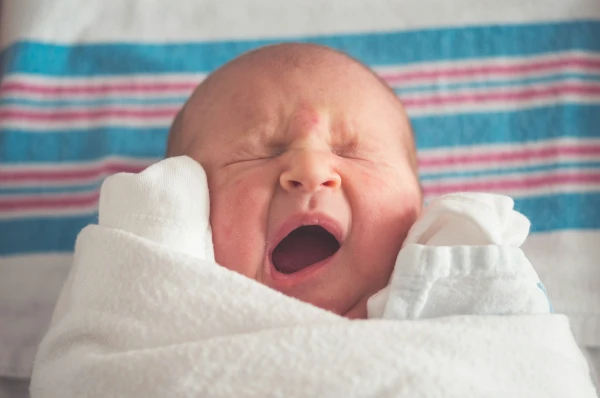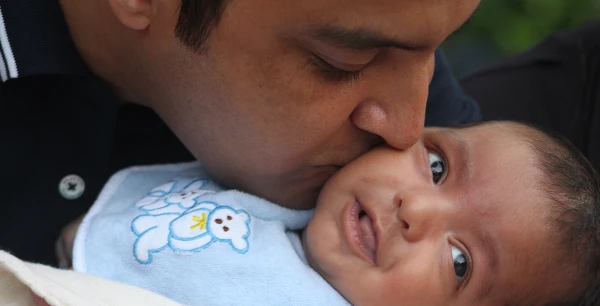Holiday Sleep Disasters: How to Avoid Sleep Problems on the Road
The better they sleep at home, the less likely a holiday sleep disaster
Even if he does get out of kilter while you are away, if he’s a good sleeper, he’ll probably return to good patterns when he gets home. Conversely, if your child has only recently started sleeping through the night or going to bed without a great deal of fussing, try to postpone any discretionary travel for at least three weeks- if you can!
Dare I even suggest having the holidays at your house this year? If that is not an option and you must travel with your newly sleep-coached child then be prepared for a little necessary backsliding. Try not to throw out all your gains and try not to rely on whatever sleep crutch you’ve just eliminated. For instance, if you stopped nursing during the night, don’t start again. Go ahead and do lots more soothing and comforting on the road than you would at home, but find some way of soothing that won’t lead you back to where you started. Don’t get caught in the intermittent reinforcement trap. You don’t want him thinking, “You got me up to nurse when we were in that strange place, maybe you will still get me up to nurse now that we are home!” You can’t blame a guy for trying!
Consider regressing your chair position
For example, if you have progressed to no longer sitting in the room at bedtime, you may want to sit by the door or closer to her crib the first couple of nights in a new place. You could also do more frequent checks instead of regressing completely back to your original sleep crutch. Don’t worry — you can resume The Shuffle when you return home at a quicker pace, perhaps moving your chair every 1-2 days because you are reminding them of a learned skill, not introducing it from scratch.
Remind them of sleep rules even when bending them
“You are sleeping in the same room as Mommy and Daddy while we are at Grandma’s but as soon as we get home, you and Teddy Bear will be back in your princess bed and Mommy and Daddy will be in our bed. We’ll still come check on you every night.” Or, “I’m going to pick you up and hold you until you fall back asleep to make you feel better, but as soon as your tummy ache goes away and you don’t need mommy to do this, you are going to sleep great again. I’ll give you so many stars and stickers because I will be so proud!”
Even very young toddlers understand some of this, and older ones get it quite well. It helps to make the rule-breaking less confusing to them, makes the intermittent reinforcement less powerful. They may have an easier time re-adapting to their old routine and understanding your expectations once the holidays and traveling have passed.
Always bring along the lovey and pack a night light
There’s no such thing as traveling light with a small child anyway, go ahead and take along favorite books and toys. Many families bring crib sheets or blankets too. (Some hotels don’t even provide much in the way of bedding with the crib or port-a-crib so check in advance or pack linens protectively). You want the child to have items that feel and smell comforting and familiar. If you are one of those moms who always keeps a small bag stocked with first aid supplies, travel sized medications, and baby toiletries, stick the spare nightlight and bulb in there as well so you don’t have to worry about forgetting it.
Before you go, talk to the hotel about portable cribs
If you are visiting relatives, think about whether there will be enough grandchildren visiting over the years to make it worth investing in an inexpensive crib, even one of the smaller fold-up varieties. Some babies don’t really like sleeping in those portable cribs with thin mattresses. You’ll learn quickly what your child can adjust to, and you’ll then be able to pack and plan accordingly on subsequent travel.
With older children who are no longer in a crib, you may request a roll-away bed, or if the child will be in a regular hotel bed in your room, you may see if you can move it closer to the wall for safety. Put an extra pillow on the floor in case he falls out, or place the bed or cot mattress on the floor so it doesn’t matter if he rolls off. You may want to place the mattress right next to your bed, or between your bed and another bed holding older siblings, so that the little one is reassured by being close to you. There’s a good chance he will get out of his bed and sneak into yours. Some parents return the child to his own bed, others figure it’s a losing battle in the hotel. If he does end up with you, carefully explain that he can sleep with you in the hotel — or at granny’s house — but will have to go right back into his own bed when you get home.
Try to have your child sleep in one place the entire trip
If you are visiting several relatives, it may be worth sleeping in one home for the entire trip, and visit with other family members during the day or over early dinners. For instance, one couple with a nine-month-old originally planned a five day vacation — two nights with one set of grandparents, two with the other, and one night at an aunt’s. I gently suggested they might want to reconsider, so they chose one set of grandparents as a “base camp” and arranged to have relatives come there to visit them or to spend part of the day at other family members’ homes. They carefully explained to all concerned why their baby needed this, and to avoid bruised feelings or rivalries they immediately let all concerned know that the other grandparents would be the “base” for the next visit.
Try very hard to get them the sleep they need
With all the change and stimulation, they may not nap while traveling. It’s up to you how hard you press the nap, you may get a sense that if you insist and make the effort, he will nap. Alternatively, you may figure that you can spend the whole afternoon in your hotel room and or in grandma’s guestroom and he still won’t sleep a wink! You might as well go out and enjoy yourself, maybe he’ll doze in the stroller or in the car.
It depends on how old the child is, and how long you are away. An infant absolutely still needs naps, a three year old can probably skip naps for a few days as long as you get him to bed at night earlier than usual. You might also want to plan some of your travel to overlap with nap time. As you know, I normally want children to sleep in their beds, not in cars, but on vacation, a car nap might be the best you can do. Plus, if you are going to be in the car for a few hours anyway, it may be easier on everyone if she sleeps through it. Try to get back to your hotel — or relatives’ home — on the early side, to have an early bedtime. Remember, a well-rested child is better behaved and more adaptable to all the changes and new people they will meet while away.
Immediately put them on their regular schedule, even with a time change
If your child wakes up at 7:00 a.m. at home in Miami, wake him up at 7:00 a.m. local time in Seattle. When you get back home to Miami, wake him at 7:00 a.m. EST. Do this the day you arrive, or if you need to recover from a long trip or a red- eye, do it the next day. Switch naps and sleep times to local time the first full day after your arrival. So if you got in late and everyone goes to bed later than usual and then sleeps in, naps will obviously be off that first day. But don’t let him nap late. Wake him from his last nap — or his only nap — early enough so you can get him to bed at his regular bedtime.
For example, if you arrived in Seattle at midnight, everyone will sleep late in the morning — hopefully. Then instead of napping from 1:00 to 3:00 p.m., he might not begin his nap until 4:00. Don’t let him nap too late, though, even if he’s a little cranky when you rouse him, so you can get him to bed that night at his regular bedtime, at 7:00 or 8:00 p.m. Seattle time. Don’t fret if you don’t follow this exactly. A few car or stroller naps aren’t a big deal over the holidays — you’ll get everyone back to normal when you get home.
Return to your normal routine as quickly as possible
Some families keep their activities very light for a day or two when returning home to really focus on getting napping and bedtime back in place. These days will also help you recuperate and become familiar again with your household’s routines. Please remember these are just guidelines to follow, and each family member’s individual personalities should be considered when traveling and adjusting to their routines. I hope these suggestions help you and your family have a well- rested, enjoyable holiday!



